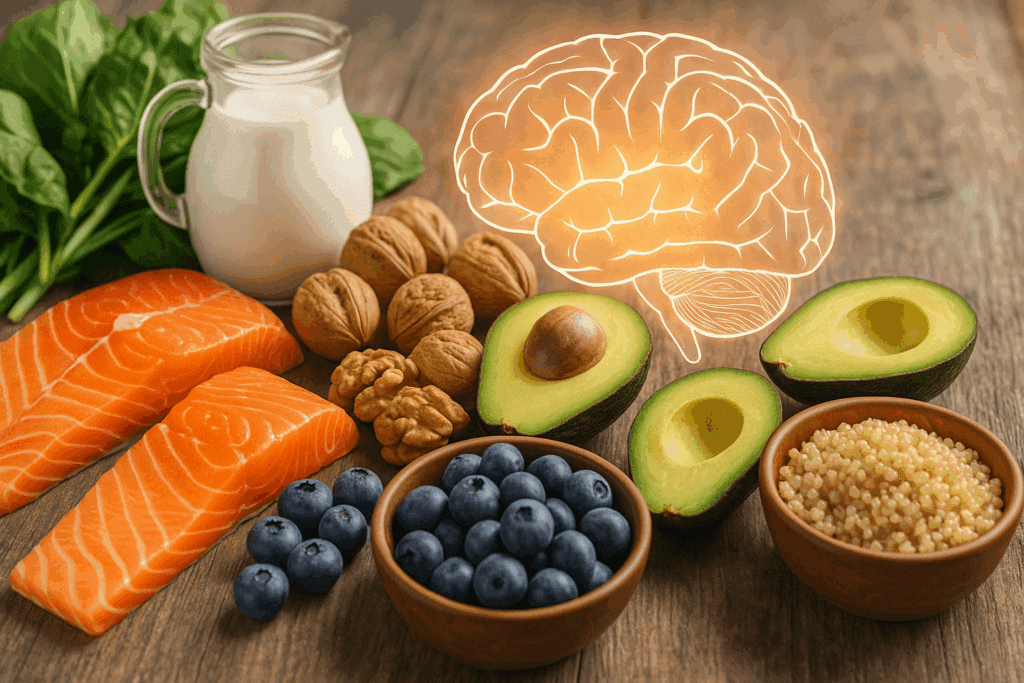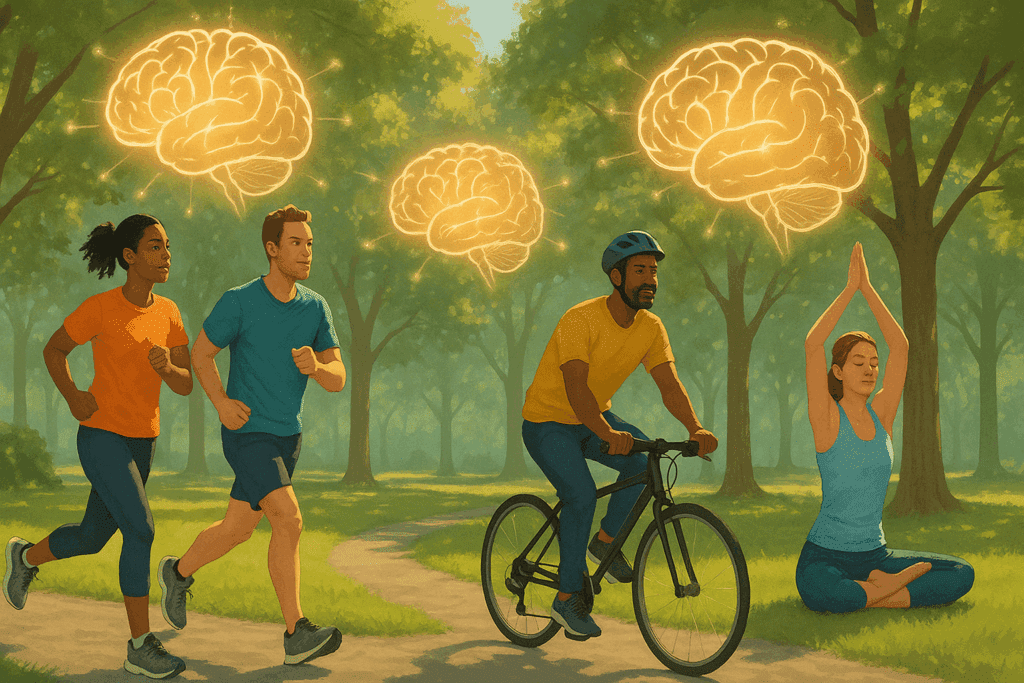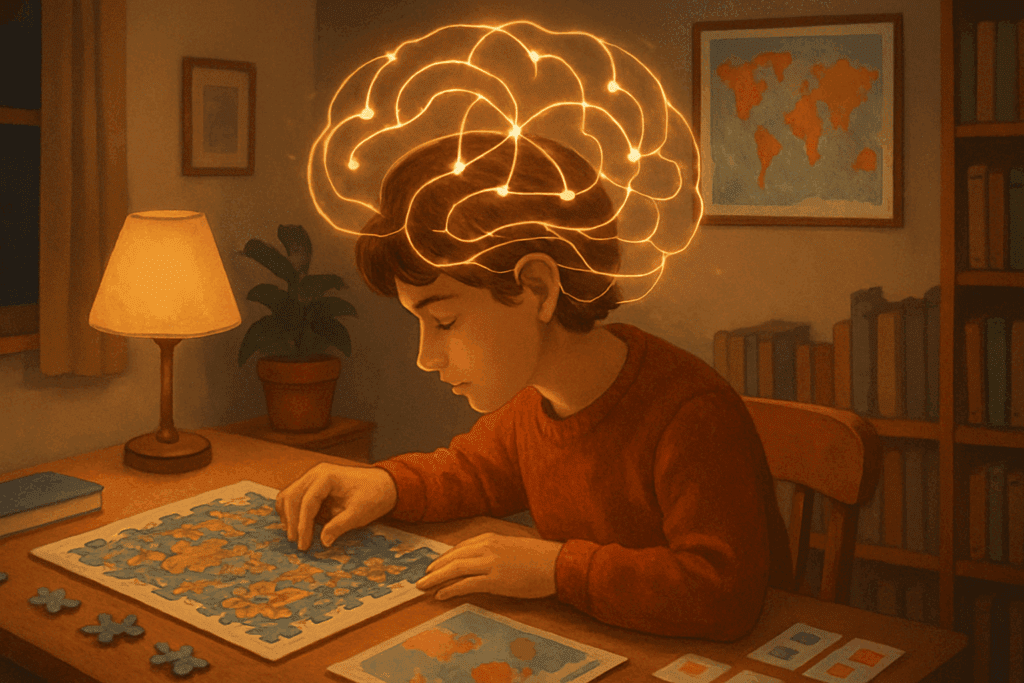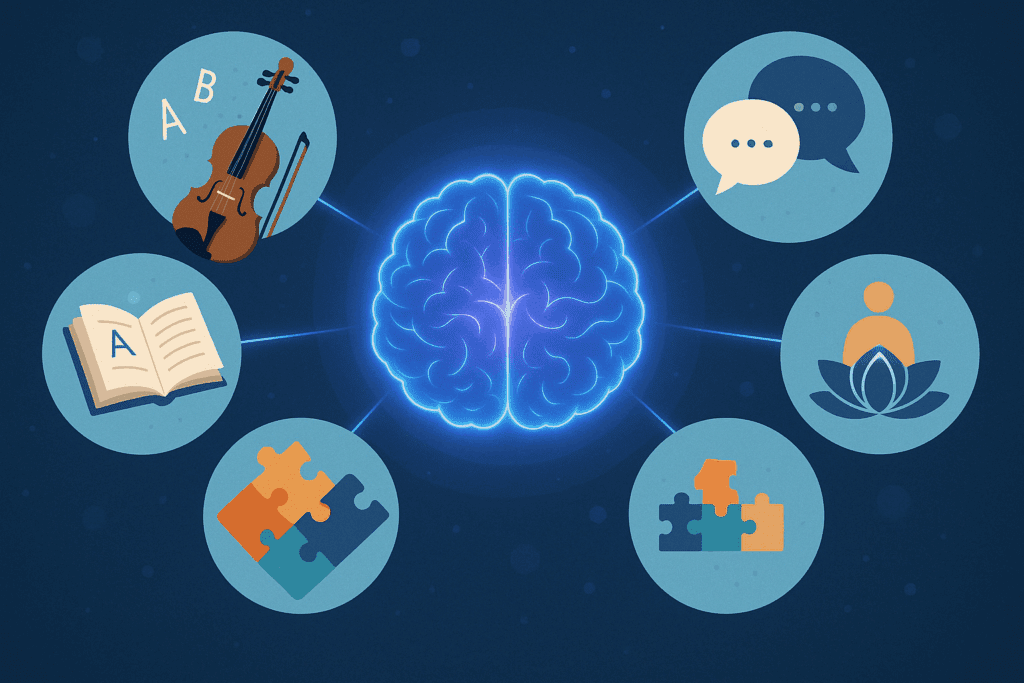Understanding the Foundations of Cognitive Brain Function
At its core, cognitive brain function refers to a vast and intricate system of mental processes that include memory, attention, problem-solving, reasoning, and language. These are the mental tools we rely on every day to learn, adapt, make decisions, and interact with the world. While cognitive function often gets conflated with intelligence, the two are distinct—cognitive function is more about how well your brain processes information, not necessarily the depth or breadth of your knowledge. Enhancing cognitive performance is not about turning yourself into a genius overnight, but rather optimizing how your mind works in real time.
You may also like: How to Choose the Best Brain Supplements for Adults: Science-Backed Ingredients That Support Focus, Memory, and Mental Clarity
From a scientific perspective, improving brain cognition requires understanding how neural pathways communicate and adapt. This adaptability, known as neuroplasticity, allows the brain to reorganize itself by forming new neural connections. It’s the biological underpinning that makes it possible for individuals to sharpen mental function through targeted lifestyle changes. The term “cognitive brain function” is sometimes used interchangeably with “mental function,” though they can differ slightly depending on the context—mental function often emphasizes emotional regulation and mental health, while cognitive brain function refers more directly to intellectual and information-processing capabilities.
To optimize these processes naturally, the key lies in consistent lifestyle strategies that align with how the brain thrives. Sleep, nutrition, physical activity, and mindful engagement with your environment all play an enormous role in your cognitive trajectory over time. Contrary to popular belief, cognitive decline isn’t an inevitable consequence of aging. Emerging research suggests that with proactive choices, individuals can support—and in some cases significantly enhance—various aspects of cognition well into later adulthood. Understanding this relationship between natural behavior and neural development offers a roadmap for anyone interested in long-term brain health and cognitive optimization.

Nutrition and the Brain: Fueling Cognitive Function Naturally
One of the most fundamental yet frequently overlooked aspects of cognitive optimization is nutrition. The brain, although representing only about 2% of body weight, consumes roughly 20% of the body’s energy resources. This demand means that what you eat has a direct and measurable impact on mental and cognitive function. Nutritional neuroscience—a field that explores how nutrients affect brain cognition—is increasingly showing that specific foods can either support or hinder your mental sharpness, memory retention, and decision-making ability.
Omega-3 fatty acids, particularly EPA and DHA, have garnered significant attention for their role in enhancing cognitive brain function. These healthy fats are structural components of brain cell membranes and are essential for synaptic plasticity, which influences learning and memory. Sources such as fatty fish, flaxseeds, and walnuts are not just general health boosters—they are direct contributors to better mental function. Likewise, antioxidants such as vitamin E and polyphenols (found in berries and green tea) reduce oxidative stress in the brain, which is a key contributor to age-related cognitive decline.
The gut-brain axis also plays an important role in brain cognition. A growing body of evidence suggests that the state of your gut microbiome can influence neurotransmitter production and inflammation levels in the brain. Probiotic-rich foods like yogurt, sauerkraut, and kefir, along with prebiotic fibers found in fruits and vegetables, help support a healthy gut environment conducive to optimal cognitive performance. This emerging connection between digestive health and cognition is reshaping how we understand the phrase “you are what you eat.”
Blood sugar stability is another critical aspect of supporting cognitive function through diet. The brain is extremely sensitive to glucose fluctuations. High-sugar diets may lead to insulin resistance in the brain, which has been linked to impaired memory and even neurodegenerative diseases like Alzheimer’s. Prioritizing low-glycemic, complex carbohydrates—such as quinoa, oats, and legumes—can help maintain a steady mental rhythm throughout the day without the highs and crashes of simple sugars.
Sleep as a Cognitive Reset: Why Quality Rest Sharpens the Mind
Sleep is not a passive state of unconsciousness but rather a highly active process that restores and reorganizes brain function. When we sleep, the brain consolidates memories, processes emotional experiences, and clears out metabolic waste through the glymphatic system. These processes are vital to sustaining and enhancing both short- and long-term mental function. Yet, in a world driven by productivity and digital overstimulation, sleep is often undervalued—despite being one of the most powerful natural cognitive enhancers.
The relationship between sleep and cognitive brain function is especially evident in tasks that require focus, reasoning, and recall. Numerous studies have shown that even mild sleep deprivation can impair decision-making and reaction time at levels comparable to alcohol intoxication. This has critical implications not only for individual health but also for public safety and workplace performance. A rested brain is not only sharper but also more capable of adapting to complex and novel challenges—a core aspect of executive cognitive function.
Sleep quality is just as important as quantity. Deep sleep, particularly during the slow-wave phase, is essential for the consolidation of declarative memory, while REM sleep appears to enhance emotional regulation and creative problem-solving. Ensuring both types of sleep requires good sleep hygiene, which includes maintaining a consistent bedtime, limiting caffeine and screen exposure before bed, and creating a sleep-conducive environment.
Interestingly, sleep also modulates the brain’s neurochemical environment. Key neurotransmitters involved in attention, such as dopamine and norepinephrine, are replenished during sleep cycles. This restoration ensures that daytime mental and cognitive tasks can be performed with greater efficiency and less mental fatigue. It is through sleep that the brain essentially “resets” its attention systems, allowing for sustained focus throughout the day.

Exercise and Movement: Physical Activity as a Cognitive Enhancer
Although cognitive brain function may seem disconnected from the body’s physical capabilities, they are in fact deeply intertwined. Regular physical activity has been consistently associated with improved cognitive performance across a wide range of age groups. The mechanisms behind this enhancement are both structural and biochemical. Exercise increases blood flow to the brain, thereby delivering more oxygen and nutrients to support neural activity. It also stimulates the release of brain-derived neurotrophic factor (BDNF), a protein that supports the growth and survival of neurons.
Aerobic exercises like brisk walking, cycling, or swimming are particularly effective at boosting mental function. These activities elevate heart rate and stimulate the hippocampus—a brain region critical for learning and memory. Over time, consistent physical activity has even been linked with increased hippocampal volume, countering the shrinkage often seen with aging. This structural benefit translates into sharper memory, faster information processing, and better executive function.
But it’s not just about aerobic conditioning. Resistance training has also been shown to improve aspects of cognition, including attention and working memory. The hormonal responses elicited by strength training—such as increased levels of growth hormone and insulin-like growth factor—may help promote neuroplasticity. Even light activity like stretching, yoga, or walking during breaks can help re-engage attention and reduce mental fatigue.
There’s also a psychological component. Physical activity reduces stress and enhances mood through the release of endorphins and other neurochemicals. Chronic stress is known to impair both mental and cognitive functioning by elevating cortisol levels, which can damage the hippocampus over time. Exercise acts as a natural counterbalance, enhancing resilience and buffering the brain against the cognitive effects of prolonged stress exposure.
Mental Training: The Role of Cognitive Engagement in Brain Vitality
Just as the body requires physical exercise to remain strong, the mind needs consistent intellectual stimulation to stay sharp. One of the most effective ways to improve cognitive function naturally is through active cognitive engagement. Activities that challenge the brain—such as learning a new language, playing a musical instrument, or solving complex puzzles—can foster new neural connections and improve processing efficiency. These mentally stimulating experiences contribute to a robust cognitive reserve, which refers to the brain’s ability to improvise and find alternate ways of getting a task done.
The concept of “use it or lose it” is especially relevant in this context. Passive consumption of information, like scrolling through social media or watching television, does little to stimulate meaningful brain cognition. On the other hand, tasks that demand concentration, problem-solving, and memory recall activate multiple regions of the brain and encourage synaptic growth. This is crucial for preserving both short-term agility and long-term brain health.
Mindfulness meditation has also emerged as a powerful tool for enhancing mental and cognitive performance. Research suggests that regular mindfulness practice can improve attention span, working memory, and emotional regulation—all vital components of healthy cognitive brain function. Meditation helps downregulate the default mode network, which is often overactive in individuals with anxiety and depression, and strengthens the prefrontal cortex, the brain’s executive center responsible for planning and impulse control.
Additionally, novelty and challenge are essential ingredients for lasting mental growth. Whether it’s trying a new hobby, reading challenging material, or engaging in intellectual discussions, keeping the brain on its metaphorical toes prevents stagnation and encourages lifelong learning. These efforts don’t just enhance momentary cognition—they lay the groundwork for long-term cognitive resilience and adaptive problem-solving.

Environmental and Social Factors That Influence Cognitive Performance
While internal factors like nutrition and sleep are critical, our external environment also plays a significant role in shaping cognitive function. Air quality, exposure to natural light, and noise levels can either support or impair brain performance. For instance, high levels of air pollution have been linked to reduced attention span and increased risk of neurodegenerative diseases. Ensuring a clean, well-ventilated space can be a simple yet powerful step toward better mental and cognitive function.
Light exposure is another key environmental variable. Natural sunlight helps regulate the circadian rhythm, which governs sleep-wake cycles and directly impacts cognitive sharpness. Bright daylight exposure has been shown to enhance mood, increase alertness, and even improve reaction times. On the flip side, excessive exposure to blue light from screens—especially late at night—can disrupt melatonin production and lead to poor sleep quality, indirectly impairing daytime cognition.
Social interactions also significantly influence brain cognition. Engaging in meaningful conversations and maintaining strong social bonds have been correlated with improved memory, emotional regulation, and even increased lifespan. Humans are inherently social beings, and interaction requires a complex interplay of language processing, empathy, memory, and reasoning—making it an excellent natural exercise for the brain.
Environmental enrichment—a concept studied extensively in neuroscience—demonstrates how stimulating surroundings lead to improved neural development. When individuals are placed in environments that offer sensory, intellectual, and social engagement, their brains show increased synaptic density and plasticity. Whether through travel, creative pursuits, or collaborative projects, exposing yourself to diverse experiences fosters more dynamic and adaptable cognitive brain function.

Standalone FAQ: Advanced Insights into Cognitive Function and Brain Cognition
1. Can lifestyle changes improve long-term cognitive brain function even without supplements?
Yes, lifestyle modifications can profoundly enhance long-term cognitive brain function. Engaging in intellectually stimulating activities—like language learning, playing musical instruments, or participating in strategy-based games—can help strengthen neural connections and promote brain plasticity. Regular physical exercise, particularly aerobic activity, has been shown to boost hippocampal volume and improve memory. Even social interaction, which is often underestimated, supports mental and cognitive resilience by lowering stress hormones that impair brain cognition. These combined habits not only support cognitive function in the present but may also delay age-related decline over decades.
2. What role does emotional regulation play in mental and cognitive performance?
Emotional regulation significantly influences both mental function and overall cognitive efficiency. When individuals experience chronic stress or emotional dysregulation, the prefrontal cortex—responsible for executive function and decision-making—can become impaired. Practicing mindfulness, journaling, or cognitive behavioral techniques helps balance emotional responses and supports healthier cognition over time. Research also suggests that regulating emotions improves attention span and working memory, two key aspects of cognitive brain function. In this way, mental and cognitive health are deeply interconnected, with emotional control acting as a stabilizer for sharper thinking.
3. How does sleep quality influence brain cognition beyond just memory?
While sleep is well known for its role in memory consolidation, its impact on brain cognition extends to attention, emotional intelligence, and even creativity. Poor sleep disrupts the glymphatic system, which clears toxins that can impair cognitive function. Chronic sleep deficits may also hinder neurogenesis in the hippocampus, a region tied to learning and spatial navigation. Furthermore, REM sleep has been linked to improved problem-solving and abstract thinking—two advanced facets of mental function. Prioritizing deep, restorative sleep is one of the most underrated strategies for sustaining optimal mind cognitive performance.
4. Can art and music therapy enhance cognitive brain function in clinical populations?
Absolutely. Art and music therapy are increasingly being recognized for their therapeutic impact on cognitive brain function, particularly in individuals with neurodegenerative conditions or cognitive trauma. Music, for instance, activates widespread brain regions involved in attention, memory, and emotional processing—enhancing mental and cognitive capacity in patients with dementia. Art therapy can stimulate visual-spatial reasoning and hand-eye coordination, while also fostering psychological resilience. These modalities offer non-invasive, enriching ways to stimulate cognition and enhance quality of life for individuals facing mental function impairments.
5. What are some underrated signs of strong mental and cognitive health?
While people often equate mental function with memory or IQ, there are several underappreciated indicators of robust cognitive health. These include adaptability to change, the ability to learn from mistakes, and effective impulse control. A person with strong cognitive brain function may also show creativity in problem-solving and emotional intelligence in social settings. Moreover, maintaining curiosity and seeking novelty are subtle signs that one’s brain cognition is active and well-nourished. These traits reflect a balanced, resilient cognitive system that supports overall mental well-being.

6. How does bilingualism affect mental and cognitive performance over a lifetime?
Bilingualism is a powerful cognitive enhancer, particularly in terms of executive functioning and attentional control. Switching between languages strengthens the brain’s ability to inhibit distractions and multitask efficiently. Over time, this sustained cognitive exercise can delay the onset of age-related cognitive decline and enhance overall brain cognition. Interestingly, studies have shown that bilingual individuals may demonstrate higher cognitive reserve, allowing them to function normally even in the presence of early Alzheimer’s pathology. As a lifelong practice, bilingualism is a valuable tool for enriching both cognitive function and mental flexibility.
7. Can digital tools like brain-training apps meaningfully enhance mind cognitive abilities?
The effectiveness of digital brain-training apps depends on the quality and scientific foundation of their design. Some well-researched platforms, especially those based on neuropsychological principles, show promise in enhancing working memory, attention, and reaction time. However, improvements tend to be task-specific unless they incorporate varied cognitive exercises targeting different aspects of mental and cognitive function. Apps that integrate spaced repetition, real-world simulations, and adaptive challenges are more likely to result in transferable benefits. While not a cure-all, these tools can complement a broader strategy to maintain cognitive brain function.
8. How do social environments shape cognitive function in adulthood?
Social environments play a profound role in shaping adult cognitive function. Engaging in diverse and meaningful social interactions stimulates language processing, emotional regulation, and perspective-taking—all of which enrich cognitive brain function. Isolation, on the other hand, has been linked to cognitive decline, depression, and reduced neuroplasticity. Community involvement, mentorship roles, and intergenerational relationships are examples of social settings that challenge the brain and maintain its agility. Thus, cognitive and mental function are not only personal but also deeply relational, evolving through shared experience.
9. Are there any early signs that cognitive function may be declining—even in high performers?
Yes, early signs of declining cognitive function can be subtle and easily overlooked, especially in high-performing individuals. These may include increasing reliance on reminders for basic tasks, difficulty multitasking in familiar settings, or changes in decision-making speed. A decline in cognitive flexibility—such as struggling to adjust when plans change—can also be an early indicator. Importantly, these changes often surface in high-stress situations where mental and cognitive systems are under pressure. Catching these signs early can prompt proactive strategies to support long-term brain cognition.
10. How might future technologies influence how we define and measure cognitive function?
Emerging technologies are poised to revolutionize how we define and assess cognitive function. Wearable neurotech, AI-driven diagnostics, and brain-computer interfaces are beginning to offer real-time insights into mental performance beyond traditional cognitive testing. These innovations may eventually refine the cognition definition medical frameworks we currently use, offering personalized benchmarks for cognitive health. Additionally, digital phenotyping and biometric tracking could enable early intervention for cognitive decline before noticeable symptoms arise. As technology advances, our understanding of brain cognition will shift from static metrics to dynamic, individualized cognitive profiles.

Conclusion: Building a Stronger Mind Through Natural Cognitive Optimization
In an age where mental fatigue and digital overload are increasingly common, investing in your cognitive brain function is both a personal and societal imperative. The science is clear: enhancing brain cognition doesn’t require prescription drugs or extreme interventions. Instead, it calls for deliberate, consistent choices that align with how the brain naturally thrives. From the foods we eat to the quality of our sleep, from how we move our bodies to how we challenge our minds, every action we take plays a role in shaping our mental and cognitive vitality.
Understanding the cognition definition in medical and practical terms allows us to appreciate the multi-faceted nature of cognitive health. It’s not about achieving perfection but about fostering flexibility, resilience, and sustained attention in a world that demands mental agility. Integrating natural strategies—such as exercise, nutrition, mental training, and environmental awareness—creates a comprehensive, science-backed approach to mental enhancement.
Ultimately, cognitive optimization is not a destination but a continuous process. By committing to daily habits that nurture brain health, we can boost decision-making, creativity, memory, and emotional intelligence. The path to a sharper, more focused mind doesn’t require magic—it simply requires knowledge, intention, and consistency. In doing so, we elevate not just our cognitive brain function, but also the quality and clarity of our lives.
Was this article helpful? Don’t let it stop with you. Share it right now with someone who needs to see it—whether it’s a friend, a colleague, or your whole network. And if staying ahead on this topic matters to you, subscribe to this publication for the most up-to-date information. You’ll get the latest insights delivered straight to you—no searching, no missing out.
Further Reading:
12 ways to keep your brain young
Exercising is good for the brain but exercising outside is potentially better


